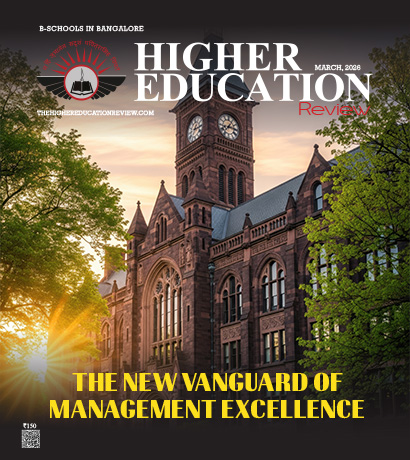Internationalisation Of Higher Education And Student Mobility

Shaun Star, Associate Professor & Associate Dean Jindal Global Law School
For moulding Indian Higher Education institutions into an international standard, we need to take a broader perspective and change the focus from outbound student mobility to inbound student mobility – the responsibility for this change falls on the shoulders of universities and faculties. Globalisation has resulted in an increased demand for the internationalization of education. In Higher Education, this has taken the form of universities with campuses all over the world, international research collaborations between institutions and scholars, the development of an international curriculum and greater mobility of faculty and students.
Globalisation has brought about a change in the function of Higher Education, as universities have been charged with the task of equipping their graduates not just with subject skills and knowledge, but with the capabilities to function effectively in the modern world. In order to be competitive in this new global context, students need to graduate with a global mindset, the ability to function in and communicate across cultures, and with the all-important plethora of 21st Century skills. One increasingly popular way to develop this cross-cultural and multi-jurisdictional skill-set that is gaining traction in Higher Education across the globe is student mobility or study abroad programmes.
There are many forms which study abroad takes; from full degree programs undertaken in overseas institutions, to a year or semester-long international exchange programs, summer schools, short-term internships, and cultural immersion programs. Over the past decade, we have witnessed many institutions building an international office or team that focus specifically on developing and creating opportunities for student mobility. Traditionally, in the Indian context, however, student mobility is most often seen with Indian students going to countries such as the United States of America, the United Kingdom or Australia to complete all or part of their degree.
“The ultimate purpose of the education is either to pursue the passion or to grab the opportunity available in the market”
For example, in the year 2017, 70,000 Indian students were pursuing a degree in Australia. In addition to this, some Indian universities offer outbound short-term mobility programmes which allow students to undertake student exchange, internships or summer schools in other countries. While these opportunities for Indian students are integral to the internationalization of India's higher education sector, in order to become truly international, India needs to take advantage of its rising status in the global world order and increase the inbound opportunities for international students from other countries.
Why should India welcome more International Students?
While there are some inbound programs such as the Fulbright Scholarship, Endeavour Scholarship, New Colombo Plan and Passport to India Program, opportunities for international students to experience India are few and far between. In the same year when more than 70,000 Indian students traveled to Australia for study purposes, 890 Australian students reciprocated and came to India under the Australian Government's flagship New Colombo Plan, albeit for short-term mobility programmes. It should be noted that this is a marked increase in numbers of Australian students and yet the stark difference in numbers is clear.
Opening the doors of higher education to international students has significant value for India and Indian Higher Education institutions. Broadly speaking, the more international students who have the opportunity to experience India, embrace its cultural diversity and growing education system, the stronger the people-to-people links between India and different countries will become. This has obvious diplomatic and economic benefits for future generations of leaders. A Member of Parliament, CEO or Vice Chancellor who has studied in India as a student, will be more likely to work closely with Indian counterparts as he or she pursues a leadership position later in their career.
Having international students on campus has a direct impact on the internationalization and cultural diversity of Indian Higher Education Institutions. This has the potential to bring global experiences and cross-cultural lessons into the Indian classrooms. As globalization and technology bring us all closer together, interactions between local and international students provide valuable experiences for both types of students. While some institutions in India are fortunate enough to boast foreign faculty and international students, there is still plenty of opportunities to increase the international student numbers.
While many foreign universities have perhaps historically seen international students as sources of revenue, the tangible benefits of having a strong international student base cannot be ignored. Indeed, in an Indian context, both Governments and globally minded universities can and should work closely together to encourage more international students to study in India given the benefits that are likely to flow on to its domestic students and institutions.
Shaun Star, Associate Professor & Associate Dean
Shaun Star is the Assistant Dean (International Collaborations) and Assistant Professor at Jindal Global Law School and Executive Director, Centre for India Australia Studies at O.P. Jindal Global Universities, where he convenes numerous student mobility programmes. Recently named as 30 people to watch in the business of law in Asia, Shaun is an Australian qualified lawyer and has worked at various top-tier law firms in India and Australia.
Globalisation has brought about a change in the function of Higher Education, as universities have been charged with the task of equipping their graduates not just with subject skills and knowledge, but with the capabilities to function effectively in the modern world. In order to be competitive in this new global context, students need to graduate with a global mindset, the ability to function in and communicate across cultures, and with the all-important plethora of 21st Century skills. One increasingly popular way to develop this cross-cultural and multi-jurisdictional skill-set that is gaining traction in Higher Education across the globe is student mobility or study abroad programmes.
There are many forms which study abroad takes; from full degree programs undertaken in overseas institutions, to a year or semester-long international exchange programs, summer schools, short-term internships, and cultural immersion programs. Over the past decade, we have witnessed many institutions building an international office or team that focus specifically on developing and creating opportunities for student mobility. Traditionally, in the Indian context, however, student mobility is most often seen with Indian students going to countries such as the United States of America, the United Kingdom or Australia to complete all or part of their degree.
“The ultimate purpose of the education is either to pursue the passion or to grab the opportunity available in the market”
For example, in the year 2017, 70,000 Indian students were pursuing a degree in Australia. In addition to this, some Indian universities offer outbound short-term mobility programmes which allow students to undertake student exchange, internships or summer schools in other countries. While these opportunities for Indian students are integral to the internationalization of India's higher education sector, in order to become truly international, India needs to take advantage of its rising status in the global world order and increase the inbound opportunities for international students from other countries.
Why should India welcome more International Students?
While there are some inbound programs such as the Fulbright Scholarship, Endeavour Scholarship, New Colombo Plan and Passport to India Program, opportunities for international students to experience India are few and far between. In the same year when more than 70,000 Indian students traveled to Australia for study purposes, 890 Australian students reciprocated and came to India under the Australian Government's flagship New Colombo Plan, albeit for short-term mobility programmes. It should be noted that this is a marked increase in numbers of Australian students and yet the stark difference in numbers is clear.
Opening the doors of higher education to international students has significant value for India and Indian Higher Education institutions. Broadly speaking, the more international students who have the opportunity to experience India, embrace its cultural diversity and growing education system, the stronger the people-to-people links between India and different countries will become. This has obvious diplomatic and economic benefits for future generations of leaders. A Member of Parliament, CEO or Vice Chancellor who has studied in India as a student, will be more likely to work closely with Indian counterparts as he or she pursues a leadership position later in their career.
Having international students on campus has a direct impact on the internationalization and cultural diversity of Indian Higher Education Institutions. This has the potential to bring global experiences and cross-cultural lessons into the Indian classrooms. As globalization and technology bring us all closer together, interactions between local and international students provide valuable experiences for both types of students. While some institutions in India are fortunate enough to boast foreign faculty and international students, there is still plenty of opportunities to increase the international student numbers.
While many foreign universities have perhaps historically seen international students as sources of revenue, the tangible benefits of having a strong international student base cannot be ignored. Indeed, in an Indian context, both Governments and globally minded universities can and should work closely together to encourage more international students to study in India given the benefits that are likely to flow on to its domestic students and institutions.
Shaun Star, Associate Professor & Associate Dean
Shaun Star is the Assistant Dean (International Collaborations) and Assistant Professor at Jindal Global Law School and Executive Director, Centre for India Australia Studies at O.P. Jindal Global Universities, where he convenes numerous student mobility programmes. Recently named as 30 people to watch in the business of law in Asia, Shaun is an Australian qualified lawyer and has worked at various top-tier law firms in India and Australia.

